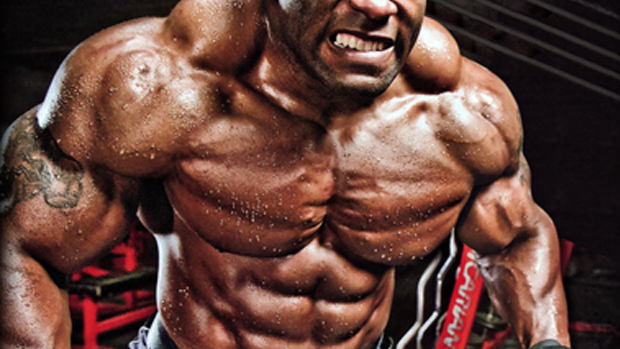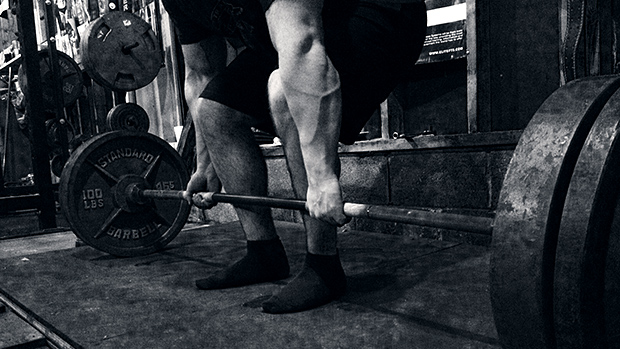Let's be very clear: if you have muscle and hustle, you're at the top of the meathead food chain. Your body stands out among the crowd and can compete with even the toughest of athletes. You're an alpha male. An apex predator.
But what if you're all show and no go like some bodybuilders? Or all raw energy with no muscle mass like some of those flimsy MMA wannabes? Well, you're just mincemeat, pal.
"An apex predator has the perfect blend of strength, muscularity, finesse, and agility," says coach Nick Tumminello. "He has the most up to date software (neurological efficiency) and the most up to date hardware (muscle mass) to accommodate it."
According to Tumminello, there are two ways to get stronger and build a great looking body that can get things done: neurologically and physiologically. And chances are you're not taking advantage of one or the other.
Software and Hardware: The Neural and Physical Advantage
If you've got the most advanced software with super-human hardware, you're in a perfect position to build and maintain an amazing body.
"You'll be an all-around badass," says Tumminello. "You'll be able to hang with everyone. Whether it's lifting heavy with the powerlifters, packing on muscle with the bodybuilders, or sprinting and moving like elite-level track and field athletes, you'll be unstoppable."
You've heard the maxim "you are what you eat." Well, you are what you train, too.
"Whichever way you use your muscles, your body will learn to adapt to it," says Tumminello. "But an overall healthy muscular guy shouldn't just focus on one aspect. It shouldn't be all hypertrophy or all speed or all strength. You need to challenge your body with different movement patterns and force it to grow and transform to your will."
Use The Force – 3 Keys to Understanding Muscle and Performance
Your muscles have the capability to do three things, provided you train them to: produce force, reduce force, and transfer force.
And each one is crucial to building the ultimate blend of machine and muscle.
Producing Force
"If you're the fastest guy on the track, or the strongest guy in the weight room, you're producing force better than anyone else there," says Tumminello.
You produce force–which makes you stronger and builds muscle–whenever you do traditional strength training movements like squats, deadlifts, chins, or presses.
Reducing Force
"If you're fairly impervious to injury, then you know how to reduce force since most injuries happen on the eccentric phase of the movement," says Tumminello.
Learning to reduce force–like decelerating a lunge, for instance–is an overlooked aspect of training but one that can save you wear and tear on joints and enable your body to heal itself more quickly.
Transferring Force
"Ever see an MMA guy go from standing to on the ground and the next thing you know he has a guy in a joint lock on the ground? That's transferring force."
In the gym that means things like plyometrics, reactive training, and full-body integrated movements like kettlebell swings or medicine ball slams.
And not only are these three aspects of force crucial, an apex predator must also know how to use his body in the most efficient way possible.
"They should be able to take a task and make it look effortless," says Tumminello. "Like a high-level Olympic lifter, every movement should be fluid."
Any wasted movement or extra effort zaps your energy and screws your results.
Form, Function, and Freaky Muscle
If you are what you train, then you need a blend of movements that work both the hardware and the software.
"I like starting with a heavy loaded exercise to hit the high-threshold motor units," says Tumminello. "But instead of a traditional rest period, I'll use an unloaded 'active recovery' exercise that'll require a lot of nervous system activation."
Since the exercises Tumminello pairs together use different muscle groups and metabolic systems, your body stays fresh.
Example:
- Deadlift for 6 reps
- Rest 30 seconds
- Swiss ball Push-ups – as fast as possible for 30 seconds
- Rest 30 seconds
- Repeat
"So we fill that rest period with a movement that won't negatively affect the deadlift and we maximize time, hit both the hardware and software, and even have a nice metabolic fat-loss effect," says Tumminello.
The beauty of this pairing is the time-based exercise. "A timed exercise doesn't interfere with your established rest periods," he says. "If I said to do twenty reps, it may take you a minute and then your rest period would be ruined. This way, you get a lot of work in a short amount of time and are still refreshed when you go back to the main 'hardware' exercise."
The Apex Predator Program – 3-Day Split
Program notes:
- Perform all * exercises at the highest intensity possible for the given sets and reps.
- Perform all yellow exercises at medium intensity for the time given.
- Unless otherwise specified, rest as little as needed between sets to successfully complete the given reps with perfect form.
- Begin all workouts with a 10-minute dynamic warm-up.
- Perform Power Work in the same session as Strength Work.
Key:
- AR – Active Recovery
- MB – Medicine Ball
- BW – Bodyweight
- DB – Dumbbell
- BB – Barbell
- 1A – One arm
- KB – Kettlebell
- CBL – Cable Column
- SL – Straight Leg
Day A (Monday) – Upper-Body Pull
Power Work
- Med Ball Power Toss Complex * - 5 rounds
- MB Rotary Toss x 4-6 each side
- MB Chest Toss x 4-6
- MB Slam x 4-6
- Rest 90 sec between sets
Or, if you don't have a medicine ball, try this:
- Barbell/Bodyweight Power Complex * x 5 rounds
- Jump Shrug x 3-4 reps
- Hang Clean x 3-4 reps
- Clap Push Up x 5-6 reps
- Rest 90 sec between sets
Strength Work
- 1. Rope Climb or Close-Grip Chin-Up * 4 x Max Reps
- AR – Lunge Matrix (Eyes closed) x 1 minute
- AR – Swiss Ball Ricochet Push up x 30 seconds
- 2. DB 1A Bent-over Row * 4 x 6-8
- AR – DB Uppercut – 30 seconds
- 3. Wide Grip Pull-up 4 * x Max Reps
- AR – Push-ups – 30 seconds
- 4. DB Biceps Curl * 2 x 8-10
- AR - Swiss ball Leg Curl x 30 seconds
Day B (Wednesday) – Leg/Hips
Power Work
- 25-yard Sprint * x 6
- Rest 25-30 sec between sprints
OR, If you don't have access to an area where you can do sprints, try this:
- Incline Treadmill Sprints * x 6
- Put the treadmill at a high incline–15 degrees–at a speed of 10mph and sprint for 5-8 seconds. Rest 25-30 seconds between sprints.
- Long Jump * 5x5
- AR - Hip Flexor Stretch 30 seconds each side
Strength Work
- 1. Trap Bar Deadlift * 4-6 x 4-6
- AR – Swiss ball 1A Plank Hold (15 seconds each arm)
- 2. BB Reverse Lunge * (Alternate Legs) 4 x 6-8
- AR – Recline Rope Pull
- 3A. BB Calf Raises * 2-3 x 12-14
- 3B. 1L Hip Thrust * 2-3 x 12-14
Day C (Friday) – Upper-Body Push
Power Work
- Med Ball Power Toss Complex * x 5 rounds
- MB Rotary Toss x 4-6 each side
- MB Punch Toss x 4-6
- MB Soccer Toss
- Rest 90 sec between sets
Or if you don't have a medicine ball, try this:
- Kettlebell/Bodyweight Power Complex * x 4 total rounds (2 rounds per side)
- Single Arm Swing x 4-6 reps
- Single Arm Clean x 4-6 reps
- Single Arm Push Press x 4-6 reps
- Perform all exercises, back to back, on one side of the body. Then perform on the other side. Rest 90 sec between sets
Strength Work
- 1. Bench Press * 4-6 x 4-6
- AR – Supine Band Shoulder External Rotation – 30 seconds
- 2. 1A Angled Press * 4x6-8
- AR – Split Stance Band Speed Row – 30 seconds
- 3. CBL Triceps Extension * 2 x 8-10
- AR – Body Saw x 45 seconds
Wrap-Up
Your physique isn't just a collection of muscles–it's a system with both hardware and software that communicate with each other. If your systems communicate poorly, your body suffers. But if everything's in sync, the results from your training will come quicker and be more dramatic.
So while a pure hypertrophy or pure strength program is a great way to go from base level to bigger and stronger, to truly become a well-rounded machine you need to vary your program and work on producing, reducing, and transferring force.




